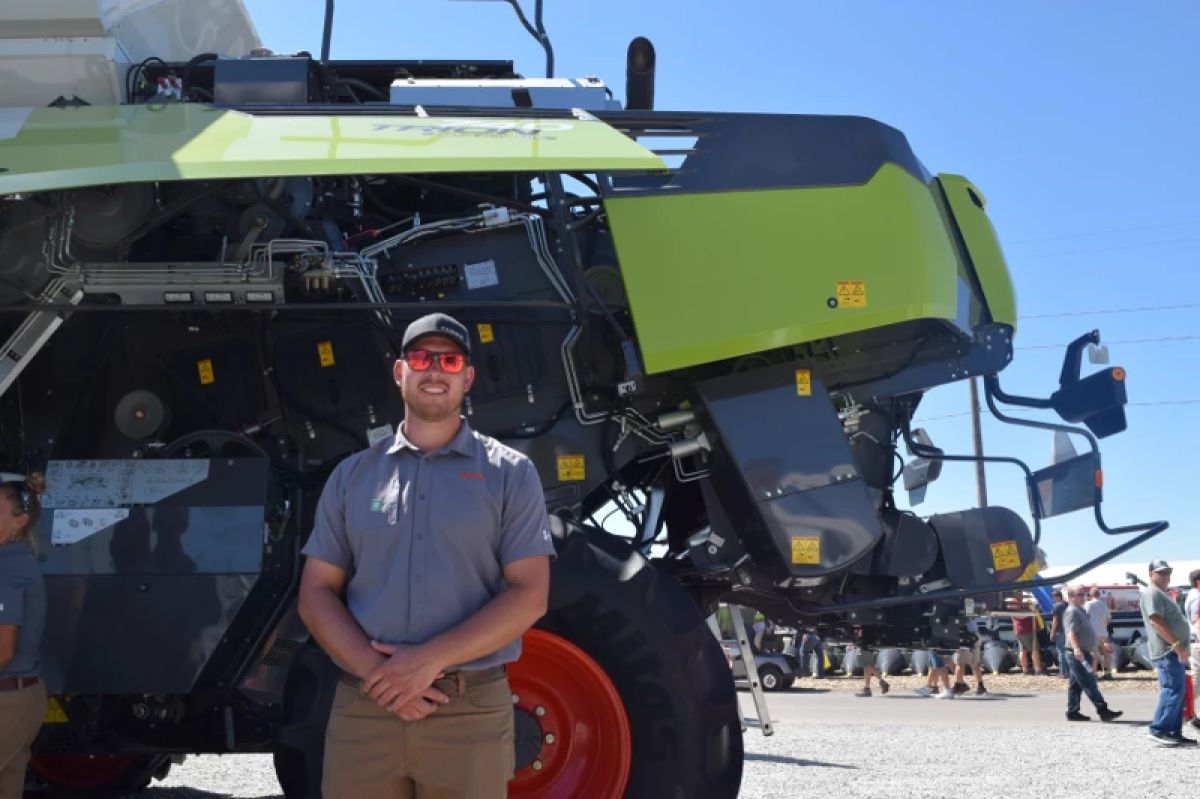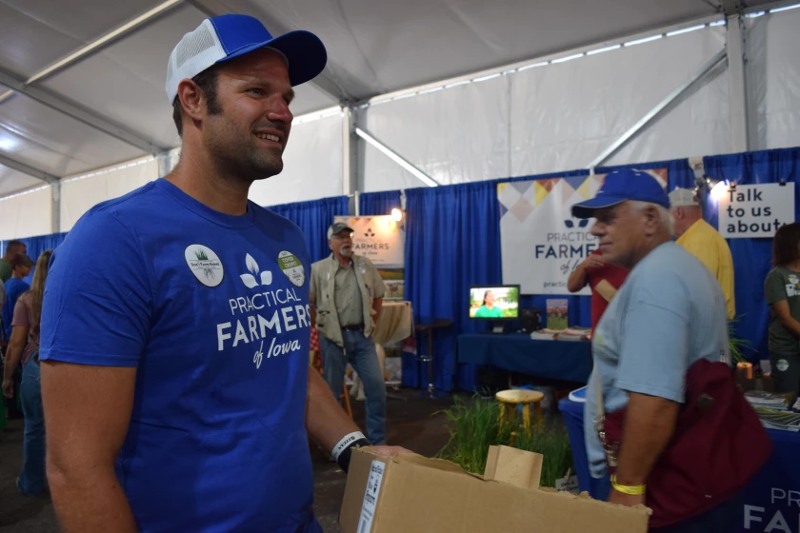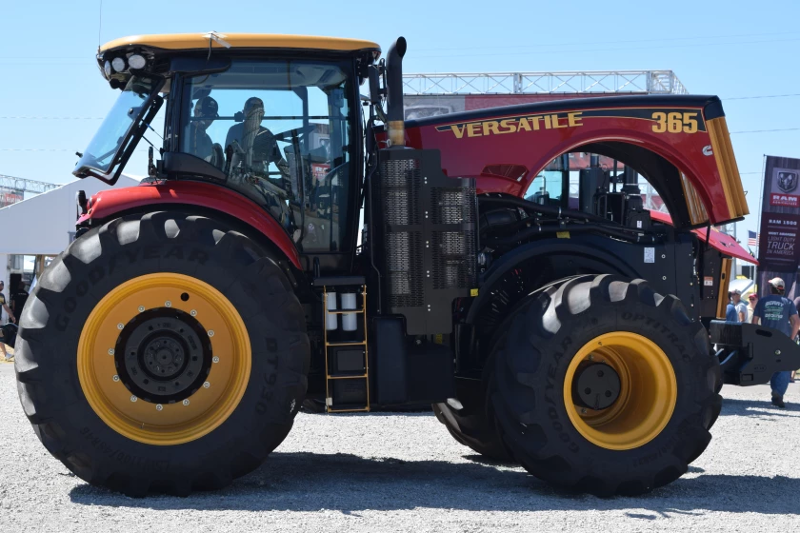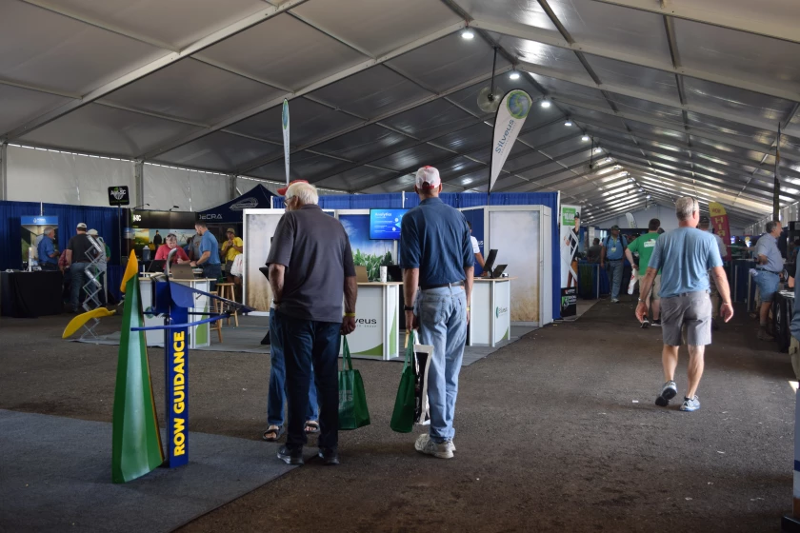
Greg Frenzel, a product manager for Claas, stands in front of the company's new combine, the Trion 740. Frenzel touted the combine's affordability for small farmers and said while farmers deal with high input costs, "if they can get a machine that fits their farm and get more performance out of the same class size for a little bit less money making it more affordable, they can start to reallocate some of those funds elsewhere." (Katie Peikes / Harvest Public Media)
Farmers flocked to Boone, Iowa this week from all over the world for the Farm Progress Show.
Billed as the largest outdoor farm event in the nation, the three-day expo showcased hundreds of exhibitors touting the latest and greatest developments in agriculture. Yet while the show can make farmers feel like a kid in the candy store, this year they’re having to weigh their purchasing decisions carefully, as fuel and fertilizer costs remain high.
“A lot of it is things that you can afford in about 10 years or so,” said Adam Ledvina, with a laugh. “But it’s worth coming to see what’s happening and all the new ideas.”
Ledvina owns and operates a meat goat business in Chelsea, Iowa. He stood inside of the Varied Industries Tent — a tent with many smaller vendors — handing out individual popcorn bags to passers-by and promoting the use of cover crops for the organization Practical Farmers of Iowa.

He also had time to check out the numerous offerings of the Farm Progress Show and look at livestock trailers. Ledvina said he wants to upgrade to a bigger one with more room to haul his goats around the state to manage forests and remove invasive species.
“All those different competitors are right close to each other,” he said. “You can really compare notes. It’s nice to kind of take a pen and paper, write down all the things and then go measure the other stuff and see exactly what you are after.”
Dan Hanson, who farms corn and soybeans near Fort Dodge, Iowa, looked at a strip till machine from the company Environmental Tillage Systems that could help minimize soil erosion while reducing the cost of fertilizer and fuel. Strip tillage is a form of conservation where producers plant and till in narrow rows.
“You have to limit what you can buy,” Hanson said, “but you’ve got to keep up to date on some of them because the future is changing. It’s always been changing in farming. You’ve got to look where your money would be best spent when you have a limited amount of money to spend.”

While farmers deal with those challenges, some businesses said the high cost of inputs are what make them stand out as more competitive.
Caitlin Keck, the marketing director for Environmental Tillage Systems, said with fertilizer and other inputs being so expensive, it draws some customers to the products her company is selling. The Farm Progress Show, she said, is great for business and helps get her company’s brand name and strip tillage out there.
“Farmers are becoming more conscious of how to use things like fertilizer most efficiently,” Keck said, “and looking into options like strip tillage.”
The Farm Progress Show alternates annually between Boone, Iowa and Decatur, Illinois. It hadn’t been in Iowa since 2018 due to the coronavirus pandemic cancellation in 2020.
A new feature: Recycled asphalt glued by soybean oil
New equipment and technology weren’t the only things that generated buzz at the Farm Progress Show: Soybeans are paving the way for the future.

This year, a partnership between the Iowa Soybean Association, Iowa State University, Central Iowa Expo and the Farm Progress Show laid down a nearly 43,000 square foot asphalt base on the floor of the Varied Industries Tent, which features about 150 exhibitors, including many small vendors.
But it’s not just any asphalt. It’s recycled asphalt glued together by a type of soybean oil called high oleic soybean oil that’s produced from the seeds of soybean plants. The asphalt uses more than 2,300 pounds of soybean oil — equal to 215 bushels of soybeans.
“It’s very few times that we as farmers get to see where that end use is besides eating it,” said Robb Ewoldt, the president of the Iowa Soybean Association. “And here we get to walk on it. We get to show what we have done in the Midwest, to promote recyclable, environmentally-friendly practices.”
The technology is being tested in Alabama and could be used to coat rural roads in the future.
Follow Katie on Twitter: @katiepeikes
This story was produced in partnership with Harvest Public Media, a collaboration of public media newsrooms in the Midwest. It reports on food systems, agriculture and rural issues. Follow Harvest on Twitter: @HarvestPM













